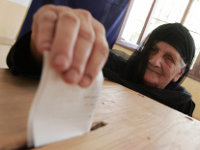Registration
You will receive an email confirming your registration.
IMGXYZ3317IMGZYXMorocco has so far weathered the storm of popular unrest and regime change in the Middle East and North Africa. Questions remain, however, about whether the reforms King Mohammed VI is undertaking have the potential to alter the political landscape in Morocco; whether the Moroccan regime is as stable as once believed; and what role, if any, the United States can play in supporting political reforms in Morocco. Carnegie hosted an off-the-record roundtable discussion to examine the current challenges and latest reforms, especially looking ahead to Morocco’s November 25 parliamentary elections.
Moroccan Reforms
- The Role of the King: King Mohammed VI has initiated a number of reforms in Morocco, in part out of a desire to maintain control over the country’s reform agenda, suggested one panelist. Given Morocco’s relatively weak political party system, it is likely that the initiative for reform will have to continue to come from the crown.
- Economic vs Political Reforms: Panelists agreed that political reforms in Morocco need to be matched by economic ones.
- Constitution: Some of King Mohammed’s reforms have focused on shifting power away from the monarchy to the prime minister and elected parliament, but more needs to be done, added another panelist.
- Popular Pressure: Popular demands for reform are likely to continue, inspired by the success of the Arab Spring across the Middle East and North Africa, the panelists stated. The Moroccan government and the king must work to find a way to address these demands.
Upcoming Elections
Morocco’s first parliamentary elections since the start of the Arab Spring will be held on November 25. The perceived legitimacy of these elections could play a critical role in shaping the path of the country’s future reforms.
U.S. Role
- A Strong Ally: The Moroccan government has traditionally been a strong ally of the United States, agreed the panelists.
- U.S. Support: The United States supports a number of programs in Morocco designed to aid the development of advocacy and civil society groups in the country and to help Morocco develop the capacity for free and transparent elections, added a panelist.
